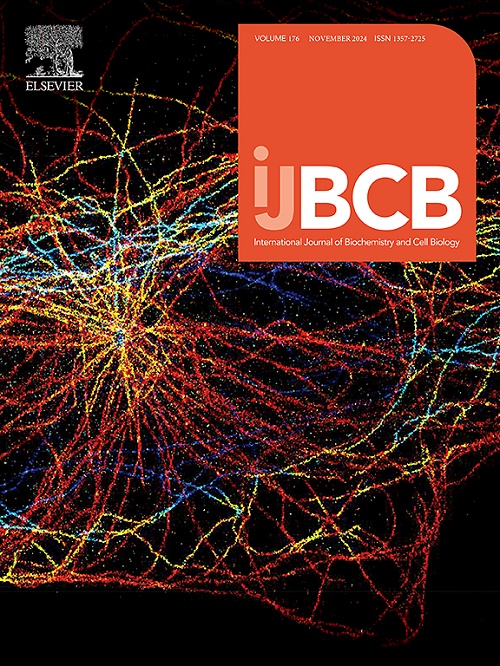Bifidobacterium apoptosis induction by measuring bax and caspases on SW948 human colon cancer cell line
IF 2.8
3区 生物学
Q2 BIOCHEMISTRY & MOLECULAR BIOLOGY
International Journal of Biochemistry & Cell Biology
Pub Date : 2025-06-03
DOI:10.1016/j.biocel.2025.106813
引用次数: 0
Abstract
Background
Nowadays, probiotic bacteria have been considered as a factor in the prevention and treatment of cancer, especially by induction of apoptosis. The aim of study, the isolation and identification of Bifidobacterium SPP, and to investigate the effects of bacterial cell extract and cell free supernatants (CFS) was on normal cell line and colon cancer cell line through measuring caspases.
Material and method
In this study, dairy products were collected and After isolation and identification of Bifidobacterium via PCR method, the cytotoxicity effects of cell free supernatants (CFS) (B.Bifidum S2 and B.Bifidum S3) and bacterial cell extract (B.Bifidum P6 and B.Bifidum P17) on colon cancer cell line (SW948) and normal cell line (HEK-293) were evaluated using MTT assay. The effect of isolated bacterial strains on apoptotic cells was determined by measuring caspases 1, 3, 9 and Bax by using ELISA kit.
Result
The results showed that the cytotoxicity effect of CFS was higher than bacterial cell extract. CFS showed the highest cytotoxicity effect (about 95 %) on colon cancer cell line. Quantitative analysis of Caspase-1, −3, 9, and Bax expression demonstrated that CFS may exert anticancer effects through induced apoptosis.
Conclusion
The results of the present research indicate that probably B.Bifidum S2 and B.Bifidum S3 isolates may be prevent colon cancer by inducing apoptosis.
双歧杆菌诱导SW948人结肠癌细胞凋亡的Bax和caspase测定
背景:目前,益生菌已被认为是预防和治疗癌症的一个因素,特别是通过诱导细胞凋亡。目的:分离鉴定双歧杆菌SPP,并通过检测半胱天冬酶,探讨细菌细胞提取物和无细胞上清液(CFS)对正常细胞株和结肠癌细胞株的影响。材料与方法:本研究收集乳制品,采用PCR法分离鉴定双歧杆菌,采用MTT法评价无细胞上清(CFS) (b.b hibifidum S2和b.b bifidum S3)和细菌细胞提取物(b.b hibifum P6和b.b bifidum P17)对结肠癌细胞株SW948和正常细胞株HEK-293的细胞毒性作用。采用ELISA试剂盒检测caspase 1、3、9和Bax,观察分离菌株对凋亡细胞的影响。结果:CFS的细胞毒作用明显高于细菌细胞提取物。CFS对结肠癌细胞系的细胞毒作用最高(约95%)。Caspase-1、-3、9、Bax表达的定量分析表明,CFS可能通过诱导细胞凋亡发挥抗癌作用。结论:本研究结果提示双歧杆菌S2和双歧杆菌S3分离株可能通过诱导细胞凋亡来预防结肠癌。
本文章由计算机程序翻译,如有差异,请以英文原文为准。
求助全文
约1分钟内获得全文
求助全文
来源期刊
CiteScore
8.10
自引率
0.00%
发文量
124
审稿时长
19 days
期刊介绍:
IJBCB publishes original research articles, invited reviews and in-focus articles in all areas of cell and molecular biology and biomedical research.
Topics of interest include, but are not limited to:
-Mechanistic studies of cells, cell organelles, sub-cellular molecular pathways and metabolism
-Novel insights into disease pathogenesis
-Nanotechnology with implication to biological and medical processes
-Genomics and bioinformatics

 求助内容:
求助内容: 应助结果提醒方式:
应助结果提醒方式:


